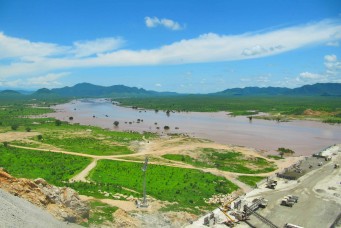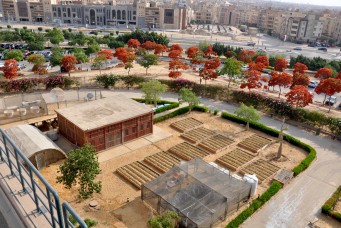Egypt’s New Downstream Diplomacy
A curious thing has happened on the Nile since the fall of Hosni Mubarak: after decades of dictating the river’s politics, Egypt is finally acting like a downstream state. Sensing both its vulnerability and opportunity for change in the wake of the January 25 revolution, Egypt’s transitional authorities have shuttled representatives from one Nile Basin state to another, making gestures in the name of cooperation and mutual development.
A curious thing has happened on the Nile since the fall of Hosni Mubarak: after decades of dictating the river’s politics, Egypt is finally acting like a downstream state. Sensing both its vulnerability and opportunity for change in the wake of the January 25 revolution, Egypt’s transitional authorities have shuttled representatives from one Nile Basin state to another, making gestures in the name of cooperation and mutual development.
The emphasis on diplomacy is long-overdue, as Egypt’s control of the Nile has gradually but steadily loosened over the last half-century. Ultimately, it took a revolution to kickstart the country’s strategic thinking. The revolution has re-prioritized the Nile issue within Egypt’s foreign policy agenda and will provide a window for the country’s new leadership to cleanly depart with policies of the Mubarak era. Egypt now faces not just an opportunity, but an imperative to revamp its policies and relationships on the Nile by relinquishing notions of hard power based upon colonial privileges and regional dominance and instead embracing soft power.
Egypt’s revolution brought the Nile issue back to the forefront of the foreign policy agenda in more ways than one. Firstly, when protesters in Tahrir Square demanded that Egypt’s role as a regional leader be restored, they were referring as much to Africa as they were the Arab world. Egypt’s monopoly over the Nile began to fray decades ago as upstream states like Ethiopia, Uganda, Rwanda, and Tanzania started to develop their own irrigation and hydroelectric capabilities (and more importantly, ambitions), and the relevance of colonial-era water agreements that promised Egypt and Sudan roughly 90 percent of the Nile’s water faded with changing geopolitical realities. Failing to sense that the time had come for a new framework to govern use of the Nile’s waters, Egypt was taken aback by the drafting of the Cooperative Framework Agreement–a treaty first introduced by upstream states in 2007 that would potentially alter water-sharing agreements and create a Nile Basin Commission to regulate activity on the river.
In behavior unbefitting of a continental superpower, Egypt’s unimaginative response once confronted with these changes was to cling to the anachronistic water treaties of 1929 and 1959 and reject development projects of upstream states. Sharif El Musa, a political science professor at the American University in Cairo, even argues that for the last ten years, Mubarak failed altogether to put forward a serious Nile policy. More concerned with relations with Israel, the U.S., and European allies, Egypt’s communication with other Nile states faltered and the regime neglected to utilize expertise on Nile issues.
Secondly, opportunistic actions of other Nile riparian states in the wake of the Egyptian revolution have upped the urgency of the need for a new Nile strategy. Closely following the fall of Mubarak, Burundi became the sixth state to sign the Cooperative Framework Agreement, giving the agreement the necessary majority in order to be ratified and implemented in the region. Furthermore, in late March, Ethiopia announced that it would commence construction of its massive, 5,000-megawat Millennium Dam without the endorsement of Egypt or Sudan. While official statements deny that either state sought to exploit Egypt’s internal political turmoil in order to advance its own interests on the Nile, it proved the perfect opportunity to force Egypt’s hand.
Recognizing that antagonistic policies on the Nile are no longer sustainable, Egyptian experts are advocating a new approach, starting with greater flexibility towards the Cooperative Framework Agreement. Egypt’s rigid rejection of the CPA stems from its fear that a new Nile agreement will reduce its allocation of water, a threat the state considers to be existential. However, as Ana Cascao, a Nile expert at the Stockholm International Water Institute, explains, changes that the CPA would usher in are firmly in Egypt’s interests. Geopolitically, downstream riparian states are the ones vulnerable to the repercussions of upstream actions and thus in need of protection. Upstream countries have been building dams and initiating projects that affect the Nile’s flow, if in minute ways, for years. With changes on the Nile already being set in motion by riparian states unbound by Egypt’s colonial treaties, Egypt could benefit from the creation of a Nile Basin Commission to regulate activity and promote transparency regarding where and how water is being used.
Egypt’s cooperation does not necessarily mean giving up power on the Nile, but trading hard power for soft power. In an article in Al Masry al Youm, El Musa details several ways that Egypt can begin to exercise soft power, including assistance to other Nile riparian states in irrigation techniques; increased import of agricultural commodities from the other states; contracts to purchase electricity from hydro-electric power stations upstream that the Ethiopian and Ugandan governments wish to build; and cooperation in both public and private sectors in order to establish basic industries and in the design and construction of communication and transportation facilities. “The deployment of Egyptian soft power could influence how much water these [upstream] nations would demand or actually use, and how they would divide it between hydroelectric power generation and irrigation,” El Musa writes.
These sorts of changes are unlikely to crystallize in the near future, primarily because they necessitate a sitting (rather than transitional) government as well as the recovery of the private sector. However, transitional authorities and civil society groups are already hard at work to lay the foundation for a new strategy. Since March, popular committees comprised of prominent politicians, former diplomats and ministers, activists, and youth leaders have visited Uganda and Ethiopia in attempts to thaw tensions and pave the way for better relations. Sudan, Uganda, and Ethiopia topped Prime Minister Essam Sharaf’s list of official diplomatic visits upon assuming office. Egypt recently pledged to significantly boost trade and investment ties with Ethiopia.
Egypt’s surge of diplomacy has been effective, convincing countries to delay the ratification of the CPA, as well as prompting Ethiopia to allow a commission to investigate plans for the Millennium Dam. This is likely due in part to the clear change in Egypt’s attitude and tone; signaling genuine change, a representative of the original popular committee to Uganda told Al-Ahram Online: “We wanted to give a message that Egypt now is not represented by Mubarak. The spirit of the 25 January revolution rules now.” Government officials’ recent statements are also indicative of a shift. Water Minister Hussein El-Atfy, for example, has described cooperation with Nile Basin states as an “imperative,” heralded a “new era” in Egyptian-Ethiopian relations that would see greater cooperation in all areas, and verbally committed support to projects that benefit upstream states.
Also encouraging is the leadership that Egypt could put towards creating and implementing a new Nile policy. According to both Cascao and El Musa, Egypt has a core of diplomats, politicians, and experts who worked towards regional cooperation within the context of the Nile Basin Initiative in the early 1990s. These individuals would be well served by their recollection of what a cooperative Nile Basin community looks like, awareness of the pitfalls of mistrust among Nile states, and an acknowledgment that Egypt must waste no time in re-engaging its neighbors.
Sarah Grebowski blogs from Egypt at Cairo Comment. She is a former research assistant at the Carnegie Middle East Center in Beirut.



